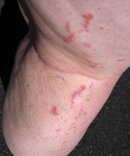Photo of the sting, 9 days after it happened, can be seen publicly on my Facebook page (because I don't know how to attach it directly to this forum post).
Jessica Lundgren | Facebook
FIRE CORAL OR JELLYFISH STING while scuba diving in Cozumel, Mexico, on 7/21/15, on right lateral thigh/calf behind knee. If anyone is familiar with this kind of rash, please let me know. I saw my regular family doctor today and she didn't know what, if anything, to do about it. The linear rash has become much darker red and the lines are lifted above skin level now, rather than just color on the skin. They are somewhat rough textured now. Initially the sting hurt and was flushed with vinegar twice. Since then there has been some mild itching like a mosquito bite, but I have been trying very hard not to scratch it. Since I was reading online about secondary Vibrio marine bacterial infections from stings, that made me think to post a picture on case anyone knows anything about these rashes. My doctor told me I could go to an infectious disease expert, but I know that would be expensive, even with health insurance. Many thanks!
Jessica Lundgren | Facebook
FIRE CORAL OR JELLYFISH STING while scuba diving in Cozumel, Mexico, on 7/21/15, on right lateral thigh/calf behind knee. If anyone is familiar with this kind of rash, please let me know. I saw my regular family doctor today and she didn't know what, if anything, to do about it. The linear rash has become much darker red and the lines are lifted above skin level now, rather than just color on the skin. They are somewhat rough textured now. Initially the sting hurt and was flushed with vinegar twice. Since then there has been some mild itching like a mosquito bite, but I have been trying very hard not to scratch it. Since I was reading online about secondary Vibrio marine bacterial infections from stings, that made me think to post a picture on case anyone knows anything about these rashes. My doctor told me I could go to an infectious disease expert, but I know that would be expensive, even with health insurance. Many thanks!





